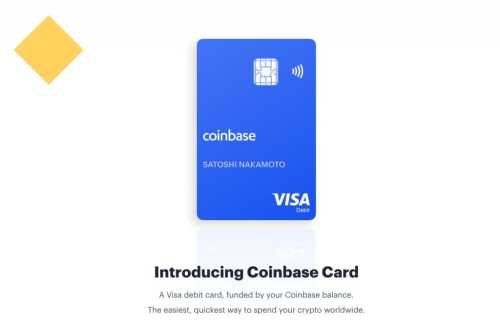Uphold Card vs. Coinbase Card: Which is Best in 2024?

Many cryptocurrency exchanges have integrated crypto debit cards as cryptocurrency payments are projected to grow 17% from 2023 to 2030. This review explores two options: the Uphold Crypto Card vs. the Coinbase Card.
In this Uphold Crypto Card vs. Coinbase Card review, we help users find the best card for spending crypto by examining their fee structures, cashback rewards, transaction limits, security aspects, and more. Let’s break them down.
Uphold Crypto Card in a Nutshell
The Uphold crypto card is a widely accepted debit card for spending digital assets. Its multi-currency capabilities enable users to transact anywhere with over 50 million supported international merchants.
Traveling and making daily purchases abroad are a breeze since Uphold does not charge a fee for foreign exchange (forex) transactions on the card. Making things even more convenient, users can instantly activate a virtual Uphold debit card for free after completing the necessary application requirements.
Based on our Uphold debit card review, the platform supports over 300 crypto assets, including the best altcoins like Ethereum (ETH), Solana (SOL), and BNB. To fund the card, holders can select one of 20 supported fiat currencies as the preferred national currency or any digital asset as the source of funds.

Regarding other Uphold card fees and rewards, users who want to keep a physical Uphold debit card must pay a one-time application fee of £9.95. It will be shipped within 7 to 10 working days. Meanwhile, 1% cashback rewards are paid out in GBP for transactions funded by fiat currencies.
Designed to work seamlessly with the Uphold platform, the card keeps track of purchases, withdrawals, and spending in real-time for better crypto transaction management. Furthermore, the debit card is compatible with Apple Pay and Google Pay for convenient mobile payment integration.
Note that the Uphold crypto card is currently only available for UK residents. However, the Uphold platform and its services are still available in the United States, most of the EU, Australia, Canada, and other major regions.
Based on our analysis of Uphold’s features, fees, and user experience, we consider it one of the best crypto debit cards in 2024.
Visit Coinbase
Coinbase Card in a Nutshell
The Coinbase Visa crypto card functions like a standard payment debit card and can be funded with supported cryptocurrencies. Regarding funding, users simply transfer the digital assets from their Coinbase accounts to the card.
Issued in the UK by Paysafe in 2019, the Coinbase card automatically converts the transferred cryptocurrency to fiat whenever a purchase is made. In terms of transactions, the card can be used wherever Visa debit cards are supported. This includes international merchants, ATM withdrawals, and other payments.

The Coinbase platform offers some of the best crypto to buy, with multiple assets including Bitcoin (BTC), Ripple (XRP), and Dogecoin (DOGE). The site supports over 240 digital assets in total.
Other Coinbase crypto card benefits include:
-
- Up to 4% crypto cashback rewards
-
- No fees for spending USD, GBP, or EUR
-
- 24/7 customer support
-
- No credit check requirement for the application
Based on these Coinbase card cashback and fees, cardholders have many incentives to use the leading crypto exchange platform’s crypto card over other bank cards.
Crucially, the Coinbase Visa debit card is available for UK, US, and EU users. The card is integrated with the Coinbase app, which makes it easy to manage crypto assets, spending, rewards, and investments in one place.
Visit Uphold
Uphold Card vs Coinbase Card Compared & Contrasted
In this section, we compare the key features, fees, and usability to add more perspective on the Uphold crypto card vs. Coinbase card debate.
Fees & Costs
Both Uphold and Coinbase cards have no application or annual fees, making it easy to start and keep making payments with cryptocurrencies. Both cards have instant and free virtual card setups. While Uphold’s physical Mastercard shipping costs £9.96, Coinbase’s physical card issuance is complimentary but will arrive in 2 to 3 weeks.
Geared towards travelers, Uphold offers 0% forex fees and low exchange rates for foreign purchases. The Uphold app provides easy transaction management so cardholders can better track traveling expenses while also monitoring their crypto holdings.

Conversely, Coinbase does not charge fees for its Visa debit crypto card transactions when funded with fiat. This is because cardholders can fund the debit card directly with a linked bank account. Foreign purchases are subject to selected wholesale currency market rates or government-mandated rates. In any case, Coinbase may charge additional service fees for this.
If the Coinbase card is funded with cryptocurrencies, Coinbase’s Wallet Currency Conversion is applied. In this case, the preferred spending crypto is converted to fiat at the prevailing trading rate on Coinbase’s trading platform.

The Uphold crypto card charges a flat £2.50 fee for ATM withdrawals within the UK and EU. Outside of these regions, Uphold card users must pay a £3.50 fee.
In contrast, the Coinbase card has no fees for cashing in through ATMs, regardless of location. This, however, does not include a potential operator fee that the ATM provider may charge.
Supported Cryptocurrencies & Fiat Options
As mentioned previously, users can easily set a preferred crypto asset for their Coinbase debit card to convert and spend at the point of sale. The Coinbase card supports various cryptocurrencies, including stablecoins like USD Coin (USDC). The Visa-powered card can also display its balance in three supported fiat currencies: USD, GBP, and EUR.
As one of the most flexible crypto cards, Uphold supports over 50 cryptocurrencies and offers on-the-spot conversion from crypto to fiat. Because the Uphold app has built-in forex services, cardholders can access low exchange rates for its 20 supported currencies. This includes the following:
-
- Australian Dollar (AUD)
-
- Swedish Krona (SEK)
-
- Singapore Dollar (SGD)
-
- US Dollar (USD)
-
- Pound Sterling (GBP)
-
- Euro (EUR)
Still, both the Uphold and Coinbase cards have multi-currency support through their respective card providers: Mastercard and Visa. Uphold cardholders have the upper hand for specific supported fiat currencies, which can be found in our Uphold review.
Rewards and Cashback
Uphold’s crypto card reward program provides 1% cashback on eligible card transactions when funded by a national currency balance. Rewards are paid out in GBP within 15 days after calculations are completed at the end of the previous month.
The cashback has a 1.00 GBP threshold, meaning the rewards should amount to at least £1 to be credited. The maximum value cashback that can be received with Uphold is £100.
Meanwhile, Coinbase offers higher cashbacks that go up to 4% and are distributed in cryptocurrencies. The rewards scheme is also more customizable, with options like earning 1% back in ETH, DOGE, or BTC or 4% back in GRT or XLM.
Ease of Use and Accessibility
Uphold and Coinbase provide mobile apps for iOS and Android devices, allowing users to integrate their crypto cards easily. Both mobile platforms offer real-time card transaction monitoring in an intuitive interface.
However, user ratings speak for themselves, as Uphold’s mobile app ratings have a leg up on the Coinbase app, especially for Android users. Here are the ratings listed below:
-
- Uphold App Store Rating: 4.6/5 from over 2,900 ratings
-
- Uphold Google Play Rating: 4.2/5 from over 53,800 ratings
-
- Coinbase App Store Rating: 4.7/5 from over 1.7 million ratings
-
- Coinbase Google Play Rating: 3.6/5 from over 853,000 ratings
Security and Privacy
The Uphold debit card provides critical security measures to ensure that only its users can access their funds. In addition to the standard two-factor authentication (2FA) feature, users can freeze the crypto card through the Uphold app to prevent any purchases in the case of loss. They can also change the PIN via ATM.
Furthermore, the Uphold card services are regulated by the UK Financial Conduct Authority), ensuring funds and private data are securely handled.

Coinbase also prioritizes security for cardholders, employing live fraud detection and alerts whenever they detect suspicious activity. The Visa crypto debit card can be locked on the Coinbase app to prohibit further transactions.
The Coinbase Card for UK users is provided by the leading FCA-regulated firm Paysafe. Conversely, the Coinbase debit card for US residents is supplied by the federally registered Pathward National Association (formerly Metabank, N.A.).
Customer Support and User Experience
As the larger, more established of the two, Coinbase provides fast, top-notch service based on customer support reviews. In particular, the platform generally has faster response times. Additionally, the Coinbase card and app user experience for iOS trumps that of Uphold.
Although Uphold’s support services have received mixed reviews, the platform still provides excellent self-service resources and email support. Regarding mobile user experience, the Uphold card integration with the mobile app shows more reliable and consistent performance across all devices.
What are the Pros and Cons of Each Card?
We’ve listed the pros and cons of the Uphold vs. Coinbase battle to showcase what each platform offers. Below are the Uphold and Coinbase crypto card benefits and limitations.
Uphold Crypto Card Pros and Cons
Pros
- 0% FX transaction fees
- Real-time spend tracking
- Competitive forex conversions for 20 supported fiat currencies
- Free virtual card
- Multi-currency support with Mastercard
- Google Pay and Apply Pay integrations
Cons
- Flat local and international ATM withdrawal fees
- Available for UK residents only for now
Coinbase Card Pros and Cons
Pros
- No transaction fees
- Free virtual and physical card
- No fees for ATM withdrawals (ATM operator fee may be applicable)
- No annual fees
- Up to 4% crypto rewards per eligible transaction
- Link a bank or other fiat payment method
Cons
- Limited cryptocurrencies supported
- Other fees and limits vary per account
Who Should Use Which Card?
Choosing between the Coinbase and Uphold crypto cards depends on user needs and priorities.
MasterCard vs Visa
The Uphold Mastercard and Coinbase Visa debit cards feature two of the most popular payment processing networks in the world.
Those with a strong preference for Visa, the larger of the two in terms of transactions and volume, should consider the Coinbase crypto card option. Conversely, users who are highly loyal to Mastercard and frequently purchase from Mastercard-exclusive merchants should take the Uphold debit card.
The difference between Mastercard and Visa would not impact most consumers since most sellers support both.
Maximizing Rewards
Coinbase is the clear winner for those seeking to maximize their crypto rewards. With up to 4% cashback offered, the Coinbase credit card beats several other crypto cashback providers, which offer only 2% to 3% rewards.
Uphold’s 1% cashback scheme still offers some benefits, especially those who wish to be credited in GBP. As the rewards are paid back in fiat currency, it makes the Uphold crypto card much more similar to bank cards with the same 1% cashback returns.
Frequent Travellers
While both Uphold and Coinbase cards support multi-currency transactions with 0% forex fees, one offer stands out. The Uphold debit card has a much lower exchange rate for its 20 supported fiat currencies than Coinbase.
Users who travel and spend much where Uphold’s supported currencies are prevalent will have more cost-effective transactions through the Uphold Mastercard debit card. Additionally, Uphold’s daily £1,000 ATM withdrawal limit is slightly higher than the Coinbase US card’s $1,000 ATM cap.
Conclusion
In this Uphold vs. Coinbase review, we’ve shown the best of what the two debit cards can offer and some areas for improvement. Both crypto debit cards can be set instantly and have no annual fees, foreign transaction fees, or monthly payments.
Although each card can suit different needs, we consider Uphold the better option overall due to its broader cryptocurrency support, fiat compatibility, and lower exchange rates.
Visit Uphold
FAQs
Does the Uphold card work?
The Uphold crypto debit card lets holders spend any currency anywhere in the world. In addition to retail purchases of £10,000 per day, Uphold card users can make ATM withdrawals up to £1,000 per day.
Is it good to get a Coinbase card?
Current Coinbase users will benefit from the Coinbase Visa debit card, funded by their account balances. It enables worldwide and contactless payments as well as cash withdrawals from any ATM. Non-Coinbase users can also sign up to take advantage of crypto-to-fiat spending.
Does Coinbase card have fees?
While the Coinbase card offers a convenient way to spend cryptocurrencies, it does come with specific fees. For one, the card requires a one-time fee of £4.95 to be issued. Additionally, Coinbase cards funded with crypto have a crypto-to-fiat on the card with a conversion fee when making a purchase.
Is a Coinbase card worth it?
Coinbase is ideal for those looking to spend crypto and earn rewards. However, Uphold’s crypto card provides access to more cryptocurrencies along with Apple and Google Pay integrations.
How much does Uphold card cost?
Users can start using the virtual version of the Uphold card for free. A one-time issuing fee of £9.95 is required for the physical plastic card.
How does an Uphold card work?
The Uphold card allows users to convert crypto assets from their respective accounts into fiat for spending worldwide. This opens the door to international purchases, as unlike other bank cards, the Uphold card does not charge forex rates.
References
-
- Paysafe issues Coinbase’s new Visa debit card enabling easier cryptocurrency spending (Paysafe)
-
- Do more with your crypto: beyond the buy and sell buttons (Coinbase)
-
- Visa vs. Mastercard: What’s the Difference? (Investopedia)
-
- Market size of cryptocurrency payments within payment gateways worldwide in 2023, with a forecast for 2030 (Statista)
Source: cryptonews.com



